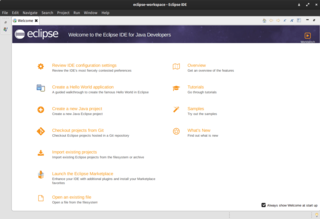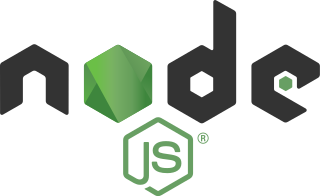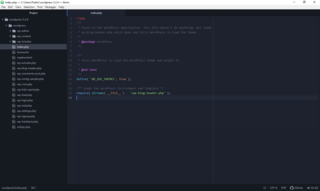
YaST is a Linux operating system setup and configuration tool.

Eclipse is an integrated development environment (IDE) used in computer programming. It contains a base workspace and an extensible plug-in system for customizing the environment. It is the second-most-popular IDE for Java development, and, until 2016, was the most popular. Eclipse is written mostly in Java and its primary use is for developing Java applications, but it may also be used to develop applications in other programming languages via plug-ins, including Ada, ABAP, C, C++, C#, Clojure, COBOL, D, Erlang, Fortran, Groovy, Haskell, JavaScript, Julia, Lasso, Lua, NATURAL, Perl, PHP, Prolog, Python, R, Ruby, Rust, Scala, and Scheme. It can also be used to develop documents with LaTeX and packages for the software Mathematica. Development environments include the Eclipse Java development tools (JDT) for Java and Scala, Eclipse CDT for C/C++, and Eclipse PDT for PHP, among others.

Django is a free and open-source, Python-based web framework that runs on a web server. It follows the model–template–views (MTV) architectural pattern. It is maintained by the Django Software Foundation (DSF), an independent organization established in the US as a 501(c)(3) non-profit.
TypeScript is a free and open-source high-level programming language developed by Microsoft that adds static typing with optional type annotations to JavaScript. It is designed for the development of large applications and transpiles to JavaScript. Because TypeScript is a superset of JavaScript, all JavaScript programs are syntactically valid TypeScript, but they can fail to type-check for safety reasons.
JSDoc is a markup language used to annotate JavaScript source code files. Using comments containing JSDoc, programmers can add documentation describing the application programming interface of the code they're creating. This is then processed, by various tools, to produce documentation in accessible formats like HTML and Rich Text Format. The JSDoc specification is released under CC BY-SA 3.0, while its companion documentation generator and parser library is free software under the Apache License 2.0.

Clojure is a dynamic and functional dialect of the Lisp programming language on the Java platform.

Node.js is a cross-platform, open-source JavaScript runtime environment that can run on Windows, Linux, Unix, macOS, and more. Node.js runs on the V8 JavaScript engine, and executes JavaScript code outside a web browser.

Sublime Text is a shareware text and source code editor available for Windows, macOS, and Linux. It natively supports many programming languages and markup languages. Users can customize it with themes and expand its functionality with plugins, typically community-built and maintained under free-software licenses. To facilitate plugins, Sublime Text features a Python API. The editor utilizes minimal interface and contains features for programmers including configurable syntax highlighting, code folding, search-and-replace supporting regular-expressions, terminal output window, and more. It is proprietary software, but a free evaluation version is available.
Dart is a programming language designed by Lars Bak and Kasper Lund and developed by Google. It can be used to develop web and mobile apps as well as server and desktop applications.

Kivy is a free and open source Python framework for developing mobile apps and other multitouch application software with a natural user interface (NUI). It is distributed under the terms of the MIT License, and can run on Android, iOS, Linux, macOS, and Windows.

Julia is a high-level, general-purpose dynamic programming language, most commonly used for numerical analysis and computational science. Distinctive aspects of Julia's design include a type system with parametric polymorphism and the use of multiple dispatch as a core programming paradigm, efficient garbage collection, and a just-in-time (JIT) compiler.

Atom was a free and open-source text and source code editor for macOS, Linux, and Windows with support for plug-ins written in JavaScript, and embedded Git Control. Developed by GitHub, Atom was released on June 25, 2015.

PlantUML is an open-source tool allowing users to create diagrams from a plain text language. Besides various UML diagrams, PlantUML has support for various other software development related formats, as well as visualisation of JSON and YAML files.

Gitter is an open-source instant messaging and chat room system for developers and users of GitLab and GitHub repositories. Gitter is provided as software-as-a-service, with a free option providing all basic features and the ability to create a single private chat room, and paid subscription options for individuals and organisations, which allows them to create arbitrary numbers of private chat rooms.

Nim is a general-purpose, multi-paradigm, statically typed, compiled high-level systems programming language, designed and developed by a team around Andreas Rumpf. Nim is designed to be "efficient, expressive, and elegant", supporting metaprogramming, functional, message passing, procedural, and object-oriented programming styles by providing several features such as compile time code generation, algebraic data types, a foreign function interface (FFI) with C, C++, Objective-C, and JavaScript, and supporting compiling to those same languages as intermediate representations.
Metasfresh is an open-source, free ERP software designed and developed for SMEs. Metasfresh is an actively maintained fork of ADempiere and can be used and distributed freely. It does not require a contributor license agreement from partners or contributors. Metasfresh was included in the Top 9 Open Source ERPs to Consider by opensource.com.

OpenKeychain is a free and open-source mobile app for the Android operating system that provides strong, user-based encryption which is compatible with the OpenPGP standard. This allows users to encrypt, decrypt, sign, and verify signatures for text, emails, and files. The app allows the user to store the public keys of other users with whom they interact, and to encrypt files such that only a specified user can decrypt them. In the same manner, if a file is received from another user and its public keys are saved, the receiver can verify the authenticity of that file and decrypt it if necessary. As of August 2021, it is no longer actively developed.

PureScript is a strongly-typed, purely-functional programming language that transpiles to JavaScript, C++11, Erlang, and Go. It can be used to develop web applications, server side apps, and also desktop applications with use of Electron or via C++11 and Go compilers with suitable libraries. Its syntax is mostly comparable to that of Haskell. In addition, it introduces row polymorphism and extensible records. Also, contrary to Haskell, the PureScript language is defined as having a strict evaluation strategy, although there are non-conforming back ends which implement a lazy evaluation strategy.
Microsoft, a technology company historically known for its opposition to the open source software paradigm, turned to embrace the approach in the 2010s. From the 1970s through 2000s under CEOs Bill Gates and Steve Ballmer, Microsoft viewed the community creation and sharing of communal code, later to be known as free and open source software, as a threat to its business, and both executives spoke negatively against it. In the 2010s, as the industry turned towards cloud, embedded, and mobile computing—technologies powered by open source advances—CEO Satya Nadella led Microsoft towards open source adoption although Microsoft's traditional Windows business continued to grow throughout this period generating revenues of 26.8 billion in the third quarter of 2018, while Microsoft's Azure cloud revenues nearly doubled.

Magit is an interface to the Git version control system (a Git Client), implemented as a GNU Emacs package written in Elisp. It is made available through the MELPA package repository, on which it is the most-downloaded non-library package, with over 3.7 million downloads as of February 2023.
















